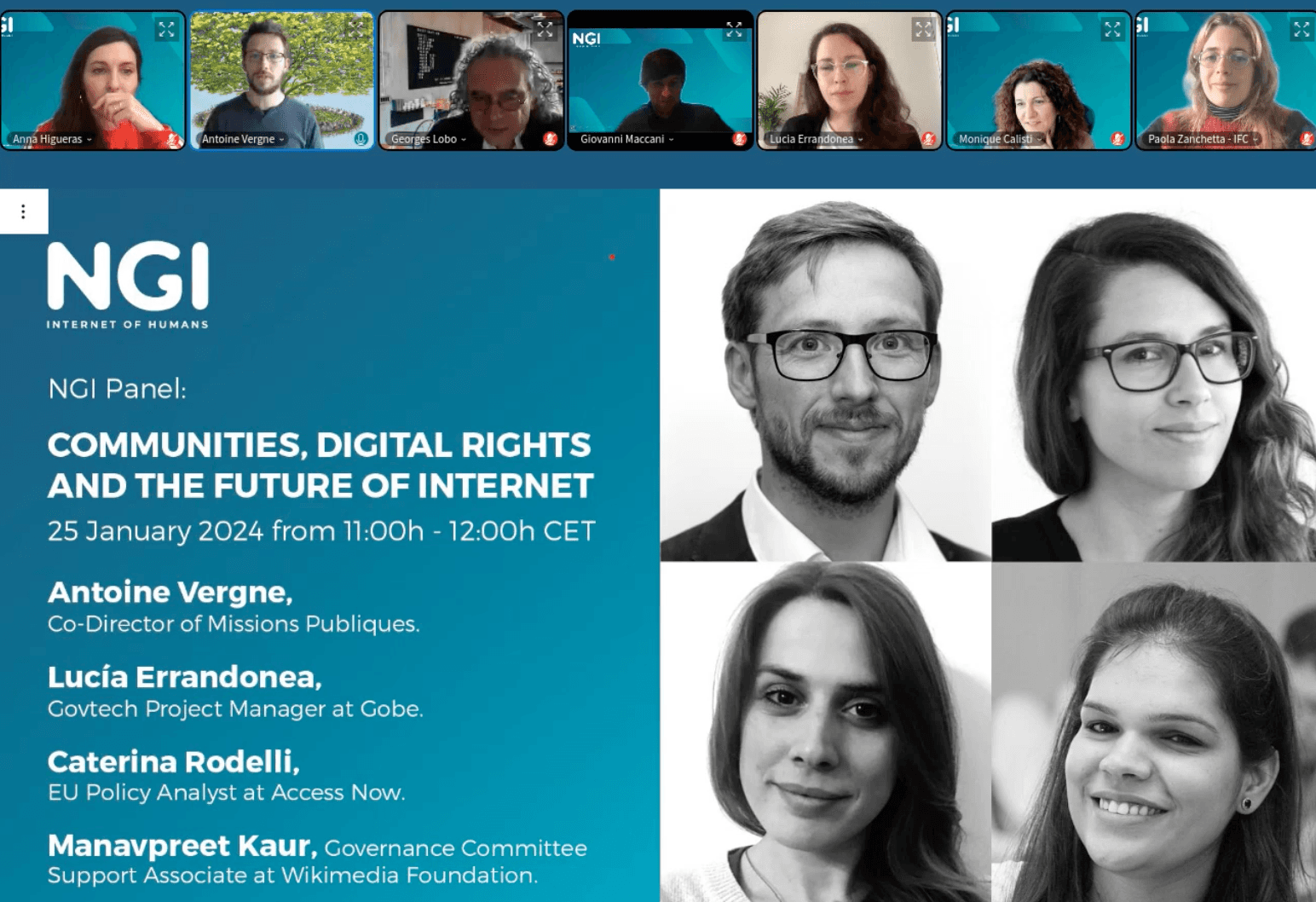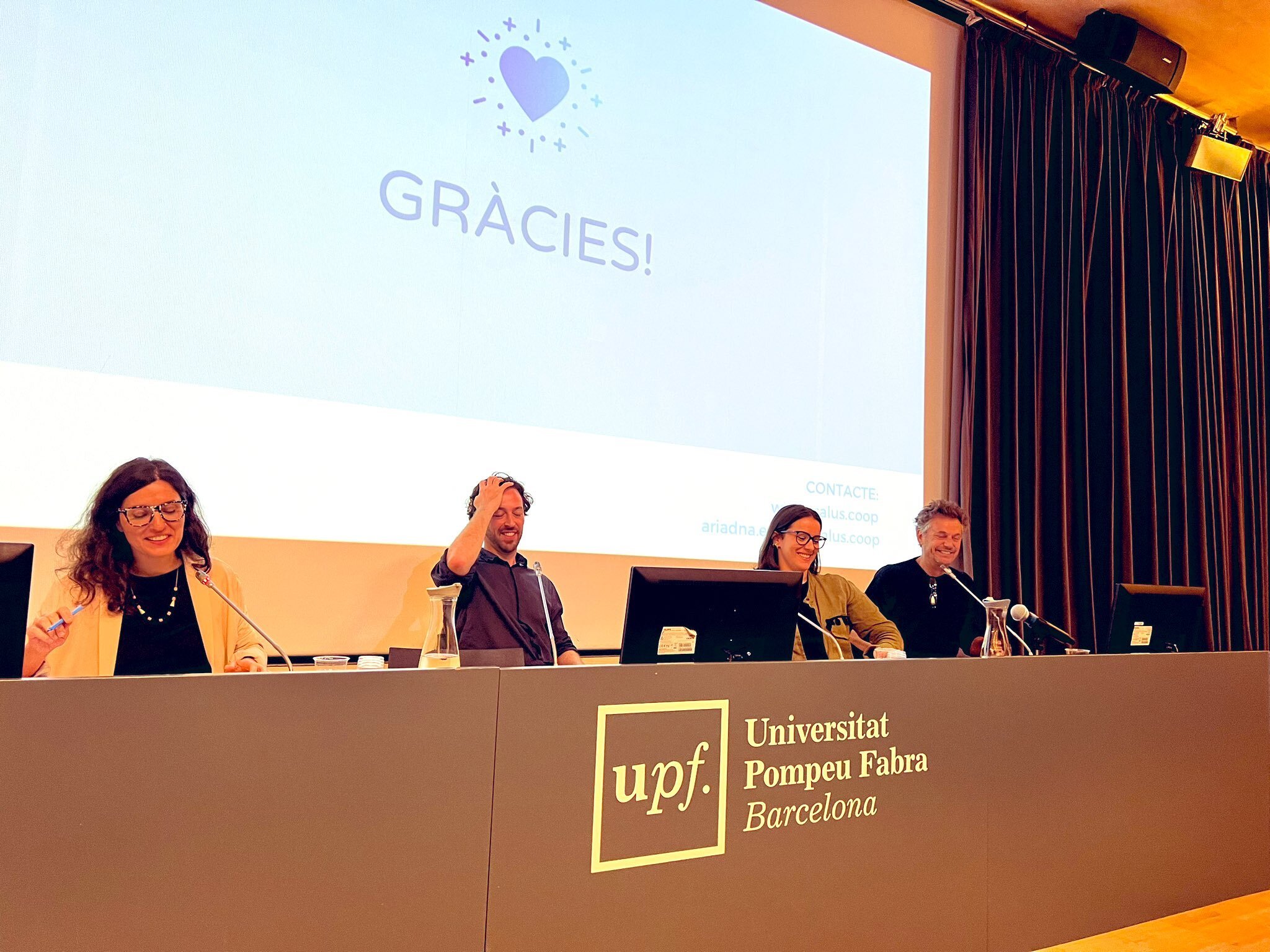Scientific research
Scientific research
NGI Forum 2023: Unlocking the Power of Digital Commons
NGI Forum 2023: Unlocking the Power of Digital Commons
4 de diciembre de 2023
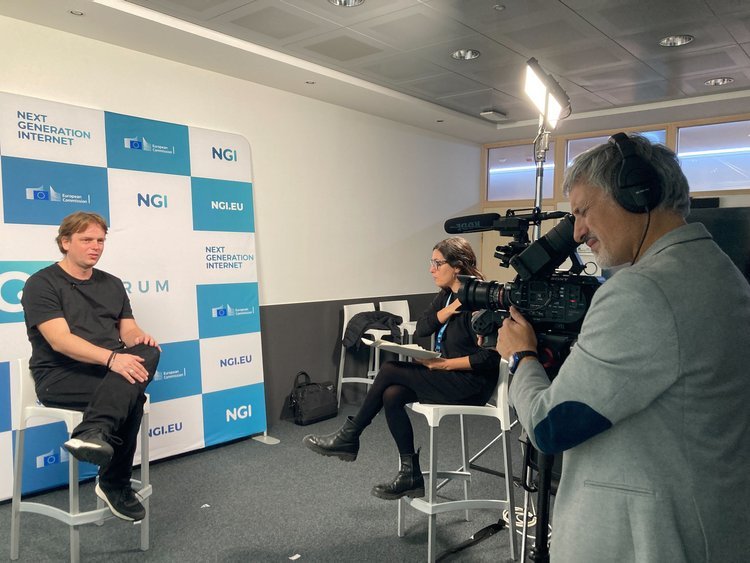

By Sergi Serra, Projects and Communication, and Anna Higueras, Project Manager at Ideas for Change. (Original publication in English)
Ideas for Change presented an analysis of the NGI programme from the perspective of diversity and inclusion, emphasizing its commitment to diversifying funding recipients and the accessibility of NGI tools and resources.
On November 15 and 16, a delegation from Ideas for Change spent two days in Brussels attending the Next Generation Internet (Next Generation Internet, NGI) Forum 2023. This two-day event brought together a diverse group of stakeholders, including politicians, researchers, academics, innovators, technology professionals, and the general public. The NGI Forum served as a platform to address the existing challenges in building a more human-centric future Internet, and in formulating the right digital policies and support mechanisms to foster the next generation of digital commons.
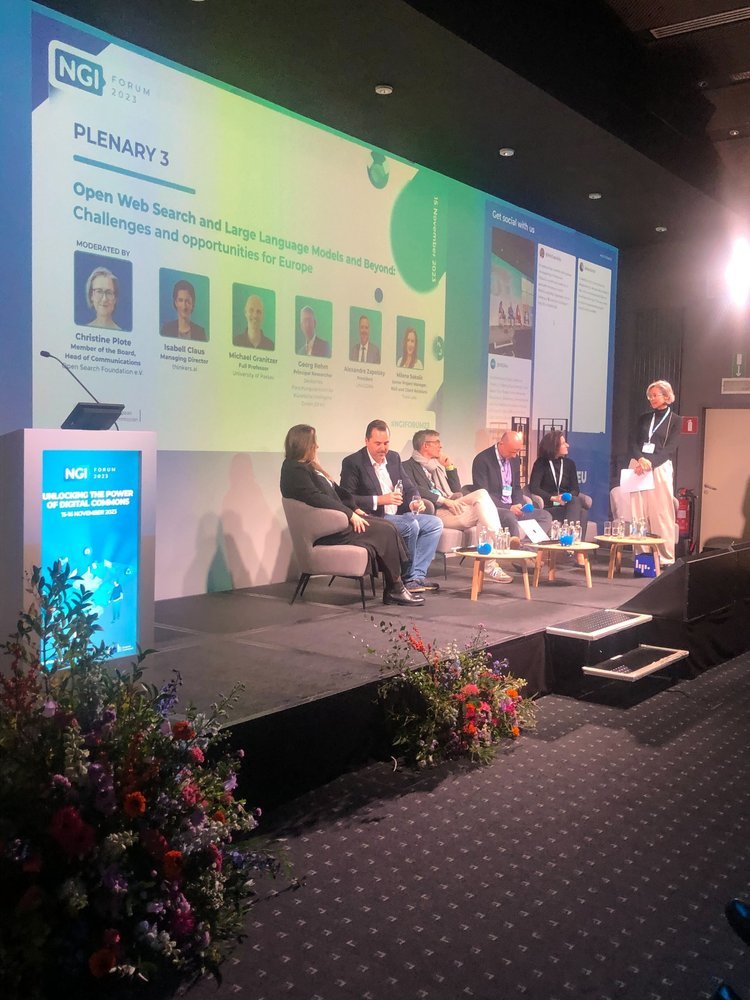
The first day of the event began with a speech by Jennifer Baker, an expert in EU policy, and Roberto Viola, Director General of the European Commission's Directorate-General for Communications Networks, Content and Technology. Following this, Henry Verdier, France's Ambassador for Digital Affairs, gave a talk on 'Digital Commons: a pillar for building a European and international digital public space.'
The day featured three plenary sessions, starting with "Towards Digital Commons: Charting the Course for Europe’s Digital Future". This panel discussed the opportunities and challenges in the development and maintenance of digital commons in Europe, current investment schemes at national and European levels, and possible pathways for a European approach that further stimulates the existing community of ‘commoners’, exploring opportunities and challenges in the development and maintenance of digital commons in Europe.
The second session, "Shaping Digital Identity and Credentials in the Era of Web 4.0", focused on the potential synergies between different initiatives to reinforce the adoption of digital identities across Europe and facilitate cross-border services, prioritizing inclusion, user protection, and privacy. The day concluded with the presentation "Open Web Search and Large Language Models and Beyond", delving into the role of web search in the development of Large Language Models and the potential for a European model of open and distributed web search.
The second day began with NGI Impact Stories showcasing exceptional contributions from NGI innovators. Alexandre Garel, analyzing Open Food Facts, discussed the challenges and development of Open Data Commons. Daniel Thompson presented Tauri, an open-source community-driven initiative to create more secure and energy-efficient applications for all platforms. Pouhiou Lafon, founder of Framasoft, presented PeerTube, a free and federated software that, installed on a server, creates a video platform (as a self-hosted alternative to YouTube or Twitch), which can federate in the Fediverse. Markus Sabadello presented Danube Tech, a company focused on building bridges that interconnect all decentralized identity networks globally. The interventions concluded with the presentation by Gäel Duval of Murena, an open-source mobile operating system committed to providing better privacy and data security for individuals and corporations.
Subsequent plenary sessions included "Securing the Open Source Frontier: Navigating Risks in the Supply Chain" and "Decentralized Social Media and the Fediverse: from niche to scale.” The former explored how open source empowers developers but also forces them to be vigilant regarding the software supply chain and how, balancing benefits with risks, security measures are essential to maintain the trust placed in open source development. The latter examined what advantages the Fediverse (a collection of independently hosted interconnected servers) may have to grow, as well as potential obstacles that need to be overcome to reach its full potential.
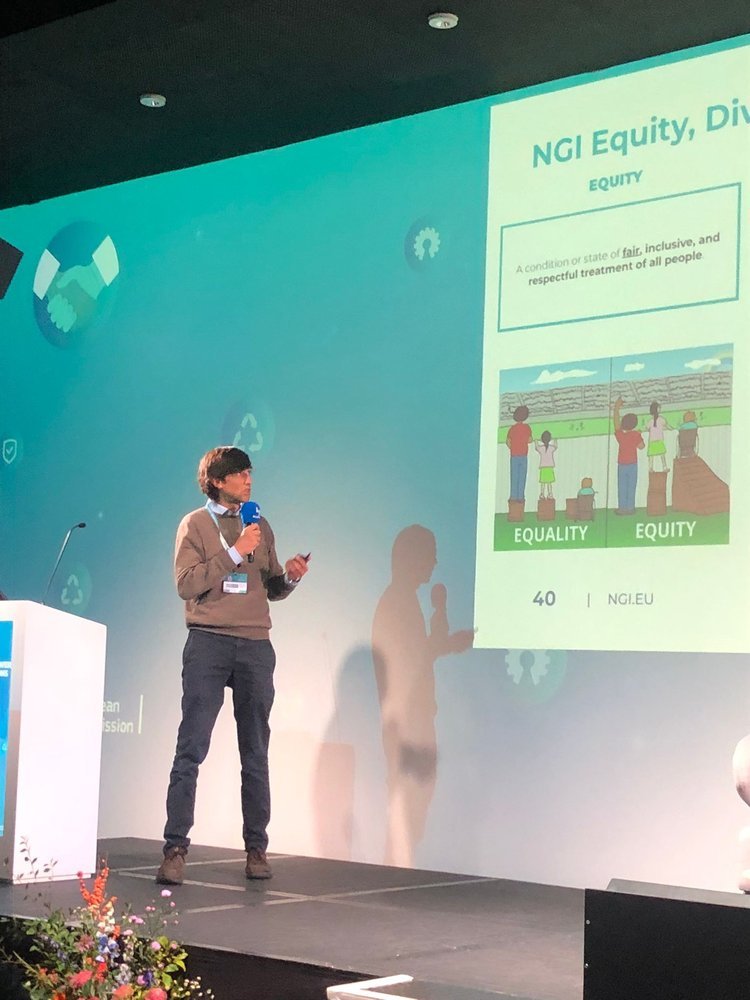
The forum concluded with six workshops, addressing topics such as ActivityPub software, licensing, and copyright information. Giovanni Maccani, Research Director at Ideas for Change, co-organized the third workshop, 'The NGI Ecosystem, more than Funding - How to be part of it'. His analysis highlighted NGI's commitment to diversity and inclusivity, emphasizing aspects such as the accessibility of NGI tools, or the need to diversify the existing profiles of innovators with public sector bodies or NGOs. The collective discussions and insights from the forum have positioned it as a vital platform to shape the future of the Internet in Europe.
The forum, whose next edition is already being prepared, is part of the EU NGI initiative to shape the development and evolution of the Internet into a Trusted Internet. A Internet that meets the fundamental needs of people, including trust, security, and inclusion, and reflects the values and standards that all citizens enjoy in Europe.
By Sergi Serra, Projects and Communication, and Anna Higueras, Project Manager at Ideas for Change. (Original publication in English)
Ideas for Change presented an analysis of the NGI programme from the perspective of diversity and inclusion, emphasizing its commitment to diversifying funding recipients and the accessibility of NGI tools and resources.
On November 15 and 16, a delegation from Ideas for Change spent two days in Brussels attending the Next Generation Internet (Next Generation Internet, NGI) Forum 2023. This two-day event brought together a diverse group of stakeholders, including politicians, researchers, academics, innovators, technology professionals, and the general public. The NGI Forum served as a platform to address the existing challenges in building a more human-centric future Internet, and in formulating the right digital policies and support mechanisms to foster the next generation of digital commons.

The first day of the event began with a speech by Jennifer Baker, an expert in EU policy, and Roberto Viola, Director General of the European Commission's Directorate-General for Communications Networks, Content and Technology. Following this, Henry Verdier, France's Ambassador for Digital Affairs, gave a talk on 'Digital Commons: a pillar for building a European and international digital public space.'
The day featured three plenary sessions, starting with "Towards Digital Commons: Charting the Course for Europe’s Digital Future". This panel discussed the opportunities and challenges in the development and maintenance of digital commons in Europe, current investment schemes at national and European levels, and possible pathways for a European approach that further stimulates the existing community of ‘commoners’, exploring opportunities and challenges in the development and maintenance of digital commons in Europe.
The second session, "Shaping Digital Identity and Credentials in the Era of Web 4.0", focused on the potential synergies between different initiatives to reinforce the adoption of digital identities across Europe and facilitate cross-border services, prioritizing inclusion, user protection, and privacy. The day concluded with the presentation "Open Web Search and Large Language Models and Beyond", delving into the role of web search in the development of Large Language Models and the potential for a European model of open and distributed web search.
The second day began with NGI Impact Stories showcasing exceptional contributions from NGI innovators. Alexandre Garel, analyzing Open Food Facts, discussed the challenges and development of Open Data Commons. Daniel Thompson presented Tauri, an open-source community-driven initiative to create more secure and energy-efficient applications for all platforms. Pouhiou Lafon, founder of Framasoft, presented PeerTube, a free and federated software that, installed on a server, creates a video platform (as a self-hosted alternative to YouTube or Twitch), which can federate in the Fediverse. Markus Sabadello presented Danube Tech, a company focused on building bridges that interconnect all decentralized identity networks globally. The interventions concluded with the presentation by Gäel Duval of Murena, an open-source mobile operating system committed to providing better privacy and data security for individuals and corporations.
Subsequent plenary sessions included "Securing the Open Source Frontier: Navigating Risks in the Supply Chain" and "Decentralized Social Media and the Fediverse: from niche to scale.” The former explored how open source empowers developers but also forces them to be vigilant regarding the software supply chain and how, balancing benefits with risks, security measures are essential to maintain the trust placed in open source development. The latter examined what advantages the Fediverse (a collection of independently hosted interconnected servers) may have to grow, as well as potential obstacles that need to be overcome to reach its full potential.

The forum concluded with six workshops, addressing topics such as ActivityPub software, licensing, and copyright information. Giovanni Maccani, Research Director at Ideas for Change, co-organized the third workshop, 'The NGI Ecosystem, more than Funding - How to be part of it'. His analysis highlighted NGI's commitment to diversity and inclusivity, emphasizing aspects such as the accessibility of NGI tools, or the need to diversify the existing profiles of innovators with public sector bodies or NGOs. The collective discussions and insights from the forum have positioned it as a vital platform to shape the future of the Internet in Europe.
The forum, whose next edition is already being prepared, is part of the EU NGI initiative to shape the development and evolution of the Internet into a Trusted Internet. A Internet that meets the fundamental needs of people, including trust, security, and inclusion, and reflects the values and standards that all citizens enjoy in Europe.

